The Toshiba/Kioxia BG4 1TB SSD Review: A Look At Your Next Laptop's SSD
by Billy Tallis on October 18, 2019 11:30 AM ESTAnandTech Storage Bench - Heavy
Our Heavy storage benchmark is proportionally more write-heavy than The Destroyer, but much shorter overall. The total writes in the Heavy test aren't enough to fill the drive, so performance never drops down to steady state. This test is far more representative of a power user's day to day usage, and is heavily influenced by the drive's peak performance. The Heavy workload test details can be found here. This test is run twice, once on a freshly erased drive and once after filling the drive with sequential writes.
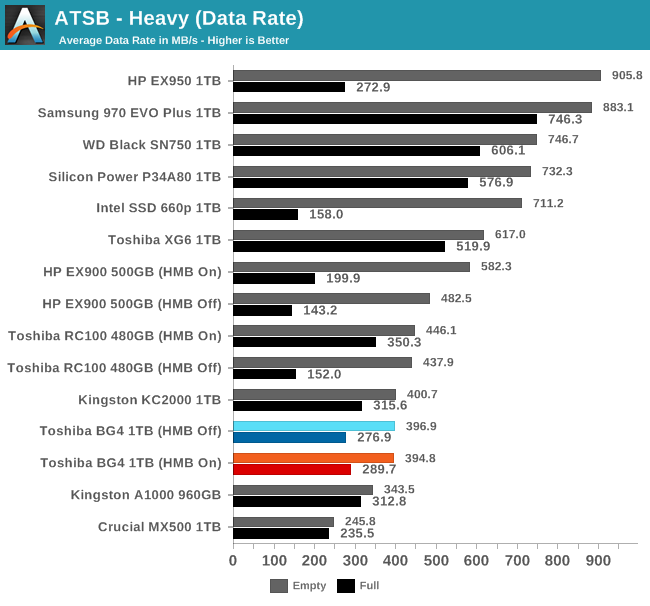
After handling The Destroyer well, the Toshiba/Kioxia BG4's performance on the Heavy test is disappointing. It's moderately faster than the mainstream SATA drive, but actually a bit slower overall than the older Toshiba RC100.
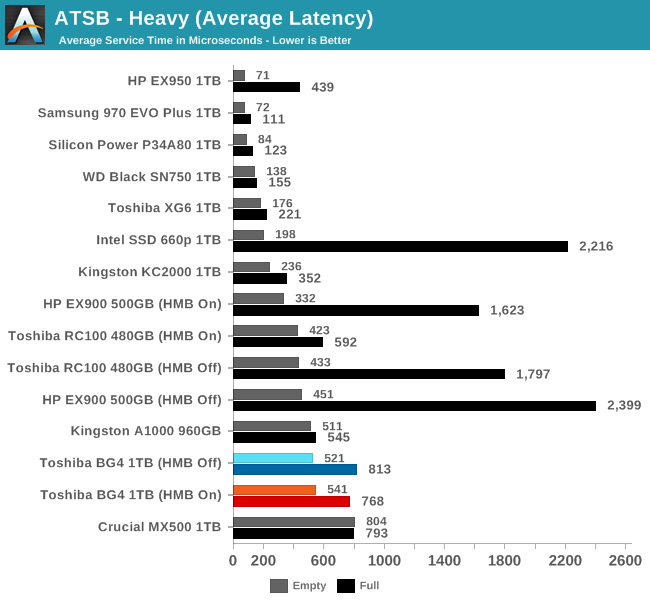
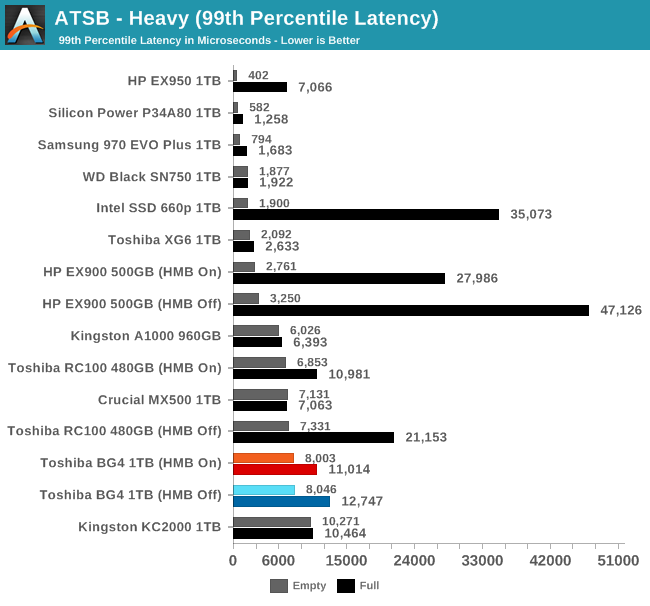
The average and 99th percentile latencies from the BG4 during the Heavy test are acceptable but unimpressive. The BG4 does handle the full-drive test run better than most of the other low-end NVMe drives, and keeps latency from going sky-high.
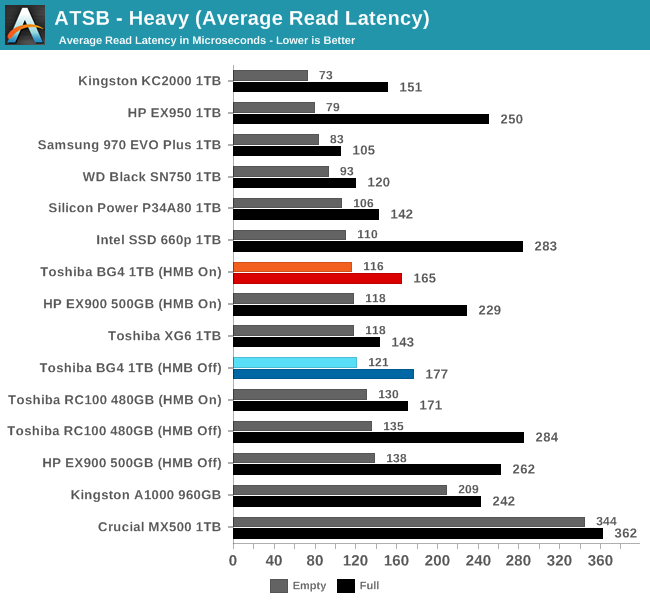
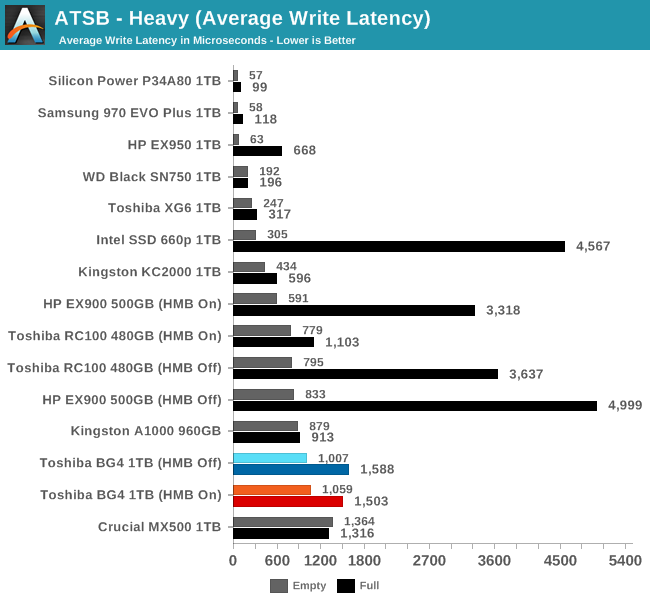
The average read latencies for the BG4 are generally competitive with other NVMe drives. The average write latencies are a bit on the high side, but even when full the BG4 only scores a bit worse than the Crucial MX500, rather than seeing latency spike by a factor of 5 or more.
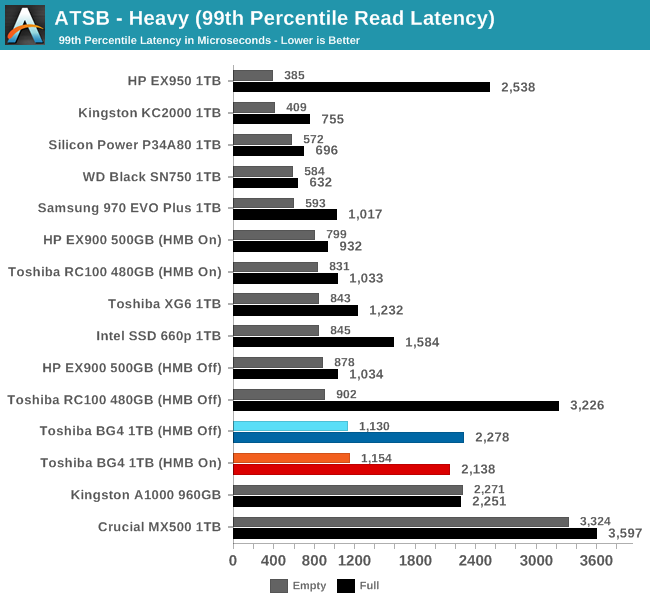
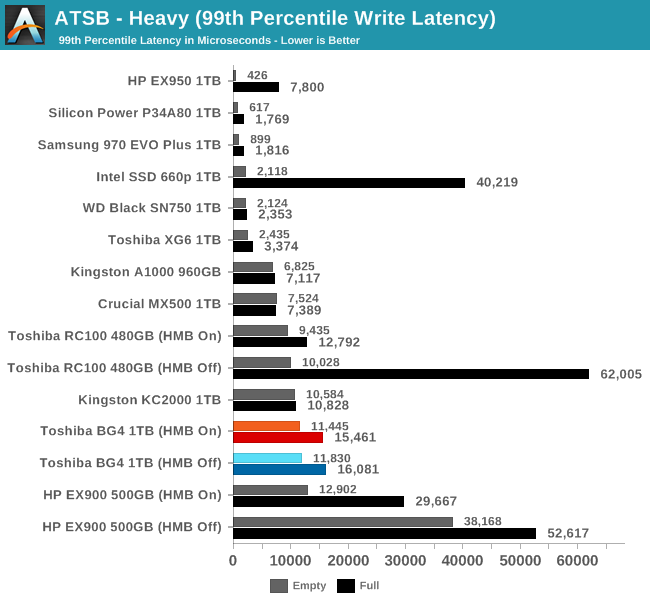
The 99th percentile read and write latency scores for the BG4 don't include any extreme outliers, but it is clear that the BG4 is still at a disadvantage relative to most of the drives that have their own DRAM.
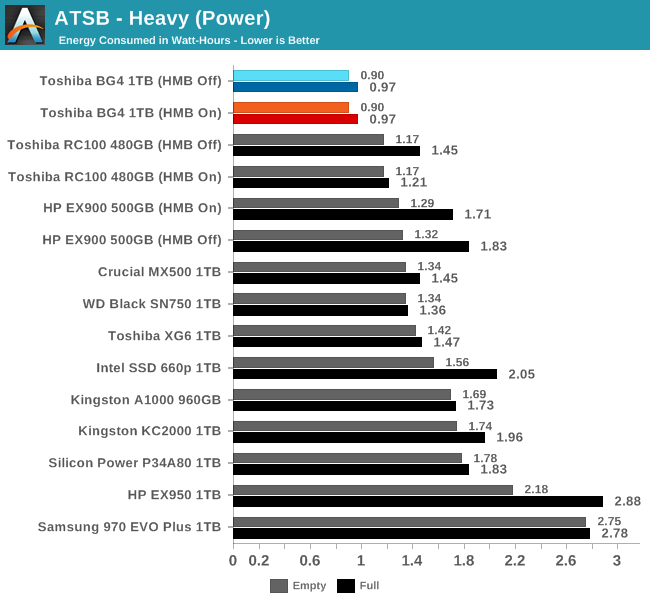
The BG4 turns in another set of excellent energy consumption scores. It's not an outright record, but it's the best yet from a NVMe drive.










31 Comments
View All Comments
MrCommunistGen - Friday, October 18, 2019 - link
I recently picked up a Dell Optiplex 3070 Micro for a family member, and it shipped with a 128GB BG4. Performance of the 128GB model is going to obviously be much lower than the 1TB model tested here.�From my anecdotal experience, performance is acceptable, but could easily be better. I replaced it with a 1TB XG6 (~$120 from eBay) - mostly for capacity, but the performance uplift was (understandably) noticeable.
abufrejoval - Friday, October 18, 2019 - link
Nice review for a solid product: Thanks!While I guess it reduces the worries about a soldered down SSD somewhat, I just hope they'll continue to sell even ultrabooks with M.2 or XFMExpress: Just feels safer and helps reducing iSurcharges on capacity.
Targon - Friday, October 18, 2019 - link
Agreed. If the motherboard fails, being able to remove the SSD for data recovery SHOULD be seen as essential by most people.Wheaties88 - Friday, October 18, 2019 - link
I don’t see why most manufacturers wouldn’t see it as useful as well. Surely it would allow for less replacement motherboards needed if they could simply change the drive size. But what do I know.kingpotnoodle - Monday, October 21, 2019 - link
Nobody considers it essential because relying on removing your SSD for data recovery if the motherboard fails is a deeply flawed strategy and not applicable to the vast majority of people who wouldn't even consider opening their laptop nevermind knowing how to remove the drive and access it outside the laptop.The same thing that saves you if your SSD fails will also save you if anything else makes the machine unbootable - a proper backup.
Targon - Monday, October 21, 2019 - link
You haven't had people come to you because their laptop has died but they need their data? Consumers may not be ready or able to get data from a dead laptop that has a drive you can remove, but the places they turn to SHOULD be able to.Tell me, can you recover data from a dead Macbook(dead motherboard) these days with the storage on the motherboard yourself? If the motherboard in your own personal laptop failed, wouldn't YOU want to be able to pull the drive if you needed data from it?
abufrejoval - Friday, October 25, 2019 - link
Those who know me well enough to entrust me with their computer, know me well enough not to come close with a Macbook.And I am not even all *that* prejudiced. I loved my Apple ][ (clone), went for the PC because even my 80286 already ran Unix and I was a computer scientist after all.
I keep doing Hackintoshs every now and then, just to get an understanding of how a Mac feels and because it's a bit of a challenge.
But it's seriously behind in just about every aspect important to me: The combination of Linux and Windows gives me much more in any direction, for work and for fun. And mixing both is much less of a technical issue than life-balance.
And then the notion of having your most personal handheld computer managed by an external party is just so wrong, I am flabbergasted that Apple managers still walk free, when computer sabotage is a felony.
The Apple ][ didn't even screw down the top lid. Swapping out components and parts, adding all sorts of functionality and upgrades made it great.
This solid brick of aluminum, glue, soldered on chips and hapless keyboard mechanics they call an Apple computer these days is just so wrong, I'd throw it into recycling the minute I got one for free. I don't know if I could give an Apple notebook or phone even to a foe, let alone a friend.
domboy - Friday, October 18, 2019 - link
Since Microsoft used this in the Surface Laptop 3, I wonder if they also used it in the Surface Pro X since that also has a removable SSD. I'll be interested to find out...taz-nz - Friday, October 18, 2019 - link
Now we just need them to apply this tech to a standard 2280 form factor and give us a 4TB m.2 SSD, doesn't have to have best in class performance just a consumer class 4TB m.2 SSD.Death666Angel - Saturday, October 19, 2019 - link
There already are Samsung and Toshiba 4TB M,2 drives.